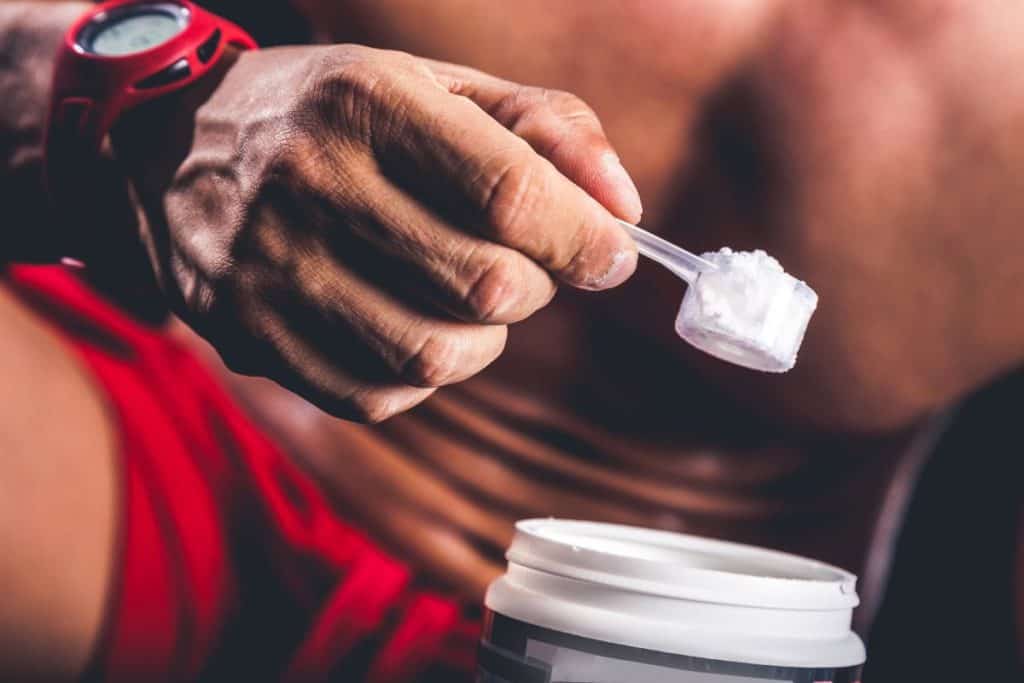Pre-workouts are a type of supplement consumed before training. Their purpose is to provide a boost in energy levels and enhance performance. But do they actually work? And are they worth the money?
Key Takeaways
- Pre-workouts usually contain caffeine, creatine, beta-alanine and other performance enhancing compounds.
- While pre-workouts are usually effective at increasing energy levels and enhancing performance, there are some drawbacks. Insomnia, dehydration or even a dependancy on pre-workouts to supply energy are all common side effects.
- You should thoroughly check the ingredients of the supplement and assess whether they are suitable for you, taking into consideration things such as medical conditions or sensitivity to stimulants. No two pre-workouts are the same.
- Stimulant-free pre-workouts are available for those who want to avoid the jittery feelings, anxiety or sleep disruption that can arise from the high-caffeine content found in pre-workouts. These alternatives may still offer benefits, such as increased power output, without the common side effects.
- Timing matters! Taking your pre-workout between 30 and 60 minutes before training is usually recommended. But consider the effects of stimulants will usually last for several hours, so if you train later in the day, you may was to avoid pre-workouts all together.
Understanding Pre-Workout Supplements

Pre-workout supplements are typically consumed in the form of powders, pills, or drinks before physical activity to increase energy levels and improve performance.
These products combine ingredients like caffeine, creatine, and beta-alanine to help you work out harder and for longer periods. However, it’s crucial to choose a pre-workout carefully, considering its contents and your health and fitness goals. Consulting a health expert before starting any new supplement is advisable.
Ingestion of the pre-workout dietary supplement led to significant improvements in anaerobic peak and mean power values in comparison to the placebo and baseline treatments. [1]
The effect of acute pre-workout supplementation on power and strength performance
Key Ingredients in Pre-Workout Supplements
- Caffeine: Enhances focus and increases fat burn, but excessive intake can lead to side effects such as insomnia and increased heart rate.
- Creatine: Known for boosting power output, particularly useful in high-intensity training.
- Beta-Alanine: Helps reduce muscle fatigue, allowing for longer and more effective workouts.
- BCAAs: Aid in muscle recovery and reduce soreness after strenuous workouts.
- Vitamin B: Boosts metabolism and energy from foods, enhancing overall stamina.
Benefits of Pre-Workout Supplements
- Enhanced Energy and Focus: Ingredients like caffeine help sharpen focus and sustain energy levels, allowing for more intense and prolonged workout sessions.
- Improved Athletic Performance: Supplements can enhance endurance, strength, and overall athletic performance, helping you achieve better results from your workouts.
- Increased Muscle Strength and Endurance: Ingredients like creatine and beta-alanine support muscle endurance and strength, aiding in more effective training sessions.
Furthermore, acute MIPS ingestion improved upper body muscular endurance and anaerobic capacity while improving feelings of focus following high-intensity exercise. [2]
The acute effects of a multi-ingredient pre-workout supplement on resting energy expenditure and exercise performance in recreationally active females
Potential Side Effects
While pre-workout supplements can offer significant benefits, they also come with potential drawbacks:
- Dehydration: High caffeine content can increase dehydration risks.
- Insomnia: Caffeine can disrupt sleep patterns, especially if consumed later in the day.
- Dependency: Regular use might lead to increased tolerance, requiring higher doses to achieve the same effects.
Non-Stimulant Alternatives
For those sensitive to stimulants like caffeine, non-stimulant pre-workout options are available. These products still enhance performance but without the adverse effects associated with caffeine.
Making the Right Choice
When choosing a pre-workout supplement, consider the following:
- Ingredients: Look for supplements with ingredients that match your fitness goals.
- Certification: Opt for products certified by reputable organizations to ensure quality and safety.
- Timing: Consume pre-workouts 30-60 minutes before exercising to maximise their effectiveness without affecting sleep.
Conclusion
Pre-workout supplements can be a valuable addition to your fitness regimen, enhancing both energy and performance. However, it’s essential to choose wisely, considering both the potential benefits and side effects.
Always consult with a healthcare provider before starting any new supplement, especially if you have pre-existing health conditions.
By understanding both the advantages and the limitations of pre-workout supplements, you can make an informed decision that aligns with your health and fitness objectives.